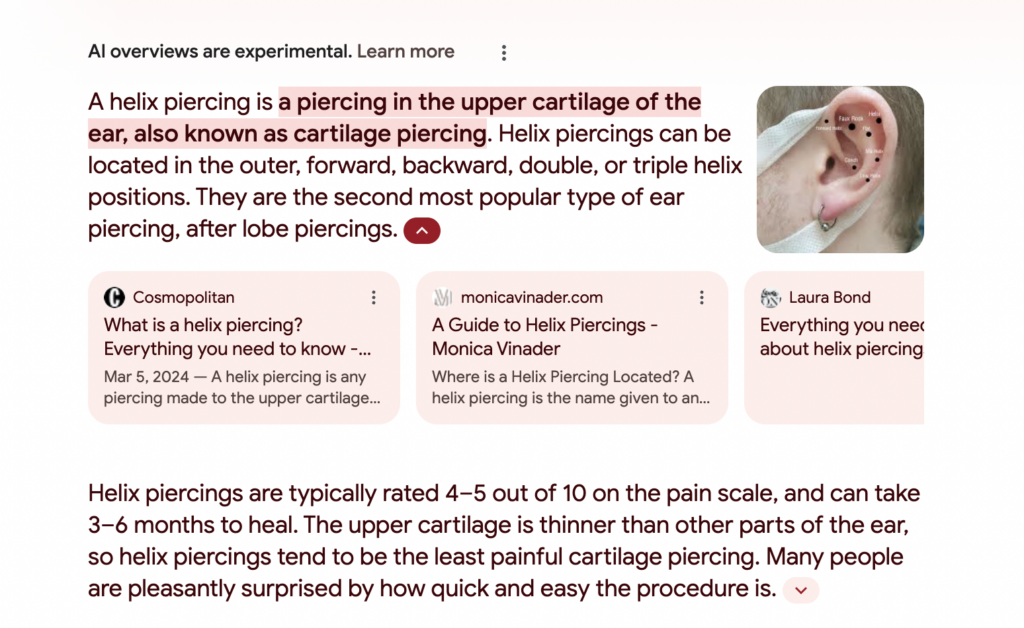As AI continues on its path of world domination — just kidding! I think? I hope? — you might have heard that many search engines, from titans of the industry to fledgling start-ups, are building algorithms that use generative AI to answer users’ queries. We discussed this topic in more detail in our last blog post, What Is Generative Search?
While generative search excels at understanding complex queries and providing quick summaries, follow-up questions, and visual information, it also has many limitations. Due to a lack of data transparency, many people find it hard to trust generative search, and this unease is amplified by the fact that AI frequently “hallucinates,” presenting false information as truth. For obvious reasons, many of us are also concerned about how it might impact our search engine optimization (SEO) efforts. Will it have a huge impact on search traffic? Do you need to revamp your digital marketing strategies? How will generative search affect SEO? Let’s explore some likely repercussions as well as optimization tips.
Generative Search & SEO
First, it’s important to note that at this point, we don’t fully understand how generative search will impact SEO in the years to come. It has the potential to both help and hurt digital marketers. While it certainly seems likely to cause a huge shakeup in the world of SEO, pinning down the exact nature of that shakeup is near impossible when the technology will inevitably evolve and mature in the coming years. With that caveat on the table, let’s explore some of the likely possibilities.
Reduction in Organic Traffic
Generative AI seeks to answer users’ queries quickly, often with a brief summary and links for further reading. While this may be helpful for users, it also means that many users won’t need to click through to a website because the search engine will give them everything they need. For example, let’s say a user asks Google’s Search Generative Experience (SGE), “What is a helix piercing?”

This AI-presented summary and image might teach the user everything they want to know about helix piercings. Although resources are provided, the user may not feel the need to click through to them. Imagine one of those websites is yours. Previously, the user might have clicked on your website to find the information they sought; while there, they might have also been introduced to your brand, learned a little about your services, and perhaps even clicked on a link inviting them to schedule an appointment!
Unfortunately, generative search will likely decrease your organic traffic. This is especially true for simple, question-based queries like “What is direct traffic?” or “How long is the statute of limitations for car accidents?” However, remember that many people who ask these simple questions are just looking for a quick answer. They’re much harder to convert and, therefore, less valuable to you.
More Pressure to Reach #1
Ranking amongst the top listings on a SERP page has always been important, but it will become even more precious as generative search pushes organic results even further down the page. SERPs are already dominated by paid ads and Google-owned properties, and generative search is worsening this issue. Users have to scroll down quite far to see the organic listings. Plus, generative search sometimes uses the top three to five results within its AI-generated “snapshot” on the SERP, and it would obviously be advantageous if your website were included.
Increase in Leads Likely to Convert
While it’s true that AI-generated summaries will satisfy many searchers, it’s also true that most people will want to conduct a bit more research. And when someone does choose to click on an AI-provided resource link or a standard search result, they’re likely to be more interested, informed, and ready to convert.
Keep in mind that generative search is supplementing traditional search results, not replacing them. Many users will still choose to scroll down and learn more. Plus, at the moment, many users don’t even see AI-generated results. Unless they opt in to Google’s SGE or choose to download a new browser, like Perplexity, they’re probably still seeing traditional search results.
Improved User Experience
Another benefit of generative search is that it typically improves the user experience. When you’re trying to find some data online, you’ll undoubtedly appreciate this. But what about as a digital marketer?
Consider the big picture. When people are happy with their search experience, they’re more likely to continue using Google. Google has been enormously popular for years, and it’s unlikely to lose its dominance anytime soon. Its popularity will ensure that there’s still plenty of organic traffic on the site, even if some traffic is lost to generative search. This may be a small consolation for digital marketers frustrated by a decrease in organic traffic, but at least it’s something.
Optimizing for Generative Search
Remember that you’re not simply subject to the whims of this new technology; you can also take action to mitigate its negative effects and perhaps even boost your SEO. The following advice may prove fruitful as AI tightens its grasp on online search results.
Use Long-Tail Keywords
Google’s SGE seems to encourage users to post long, detailed queries that mimic the way they would naturally speak in a real-life conversation. To rank more highly for these queries, optimize your content for long-tail keywords. These are keywords that are longer (maybe three to five words), more specific, and less common. While they may have a lower search volume, they often have a higher conversation value because they target niche demographics and reflect how people actually think and talk. Long-tail keywords have been in many digital marketers’ toolboxes for years, so it’s not surprising to see them popping up again now.
Produce High-Quality, Relevant Content
I know, I know, what else is new? Writing high-quality content has always been important for SEO, and it will continue to be important in the years to come, especially with the advent of AI. Generative search aims to provide fast, helpful content so it will prioritize high-quality websites that provide accurate information from reputable sources, boast an easy-to-understand writing style, and address users’ search intent.
Use Structured Data
Also known as schema markup, structured data is “a standardized format for providing information about a page and classifying the page content.” Search engines appreciate when you include structured data because it helps them understand the page’s content. It also helps them provide more informative, engaging, and relevant search results. Over time, this can give your SEO performance a boost.
Optimize for Featured Snippets
As SERP real estate becomes even more precious, consider optimizing pages with the goal of helping them be chosen by Google for featured snippets. This will give you a leg-up over other organic results.
How do you do this? There are a number of strategies you can implement, but let’s stick with the basics. First, structure your content so that search engine algorithms can easily digest it by using clear headings, bullet points, meta tags, and schema markup. Next, target question-based queries and provide helpful, informative answers. Avoid using your brand name or any first-person language in the text you want to be a featured snippet. Finally, write clearly and concisely, positioning your website as a reliable resource.
All that said, there’s a strong chance that generative AI will replace featured snippets. Optimizing for featured snippets may be helpful for a while, but it’s likely not a great long-term strategy.
Include Strong Images
If you want your SERP listing to be included in one of the AI-generated snapshots, make it stand out from the competition. Include a compelling and relevant image with clear metadata. How does this help? First, the image may increase your likelihood of being included in the snapshot at all. Plus, if your image is more eye-catching and attractive than any other images included, your listing may get more clicks. Including a strong image is especially helpful for any query where an image is an integral part of the answer, such as “how to make a gallery wall” or “how to do a sumo squat.”
_____
At the end of the day, remember that Google’s primary objective is to respond to each user’s query with the best answer possible. They understand the value of informative websites and high-quality content, and they need both to continue offering a valuable service. Although generative SEO could negatively impact certain aspects of SEO, it also presents opportunities for those willing to adapt.
If you’re hoping to build a beautiful, effective website that will rank on Google, contact 417 Marketing for help. Our team of knowledgeable, creative, and passionate professionals specializes in SEO, web design and maintenance, and Google Ads, and we have successfully completed over 700 websites since our inception in 2010. Contact us and learn more about what we can do for your company.



